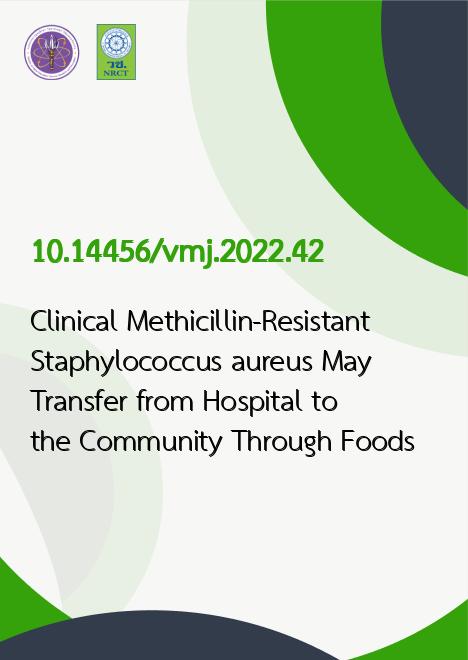
|
Clinical Methicillin-Resistant Staphylococcus aureus May Transfer from Hospital to the Community Through Foods |
|---|---|
| รหัสดีโอไอ | |
| Creator | 1. Pharanai Sukhumungoon 2. Sunisa Dangsriwan 3. Pattamarat Rattanachuay |
| Title | Clinical Methicillin-Resistant Staphylococcus aureus May Transfer from Hospital to the Community Through Foods |
| Publisher | Text and Journal Publication |
| Publication Year | 2565 |
| Journal Title | Vajira Medical Journal |
| Journal Vol. | 66 |
| Journal No. | 6 |
| Page no. | 407-414 |
| Keyword | MRSA, hospital, gastrointestinal tract, mecA, bile salt |
| URL Website | https://tci-thaijo.org/index.php/VMED |
| Website title | Vajira Medical Journal (วชิรเวชสาร) |
| ISSN | 0125-1252 |
| Abstract | Objective: To investigate the capability of methicillin-resistant Staphylococcus aureus (MRSA) and mecA-carrying Staphylococcus aureus (MCSA) transfer from hospital to community through foods due to the mecA gene is responsible for various antimicrobials resistance. Methods: We investigated four MRSA from patients and healthy carriers and one mecA-carrying S. aureus (MCSA) from food, whether they were capable of surviving through acidic condition and simulated gastrointestinal system. All bacterial strains were examined in green papaya salad's liquid portion (GPL), pH 2.0 and pH 3.0 to test their toleration ability in acidic food. Bacterial toleration to gastrointestinal system was investigated using 0.3% (w/v) pepsin-supplemented phosphate buffer saline (PBS) (pH 2.0 and pH 3.0), and different concentrations bile salt-supplemented tryptic soy broth (TSB). T-test was used to compare the bacterial survival rates at room temperature and 4?C, before exposure to GPL, pH 2.0 and pH 3.0. Results: The results revealed that MRSA and MCSA could tolerate in GPL, pH 3.0 and pH 2.0 for 2 h and 1 h, respectively. Bacterial exposure to 4?C for 3 h before incubated in GPL, pH 2.0, significantly prolonged bacterial survival (P < 0.05). Toleration to simulated gastrointestinal system demonstrated that clinical MRSA strain PSU20 well tolerated to simulated gastric juice, pH 3.0 [0.3% (w/v) pepsin] for at least 1 h with the bacterial survival populations of 4.40 log CFU/ml. In addition, this PSU20 well tolerated to all concentrations of bile salts. Conclusion: This study suggests that clinical MRSA has potential to transfer from hospital to community through foods and is able to break the gastrointestinal innate immunity establishing infection in human. This is crucial for public health stand point. |